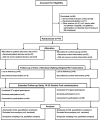Thyroid cancer patient perceptions of radioactive iodine treatment choice: Follow-up from a decision-aid randomized trial
- PMID: 26195199
- PMCID: PMC4832354
- DOI: 10.1002/cncr.29548
Thyroid cancer patient perceptions of radioactive iodine treatment choice: Follow-up from a decision-aid randomized trial
Abstract
Background: Patient decision aids (P-DAs) inform medical decision making, but longer term effects are unknown. This article describes extended follow-up from a thyroid cancer treatment P-DA trial.
Methods: In this single-center, parallel-design randomized controlled trial conducted at a Canadian tertiary/quaternary care center, early-stage thyroid cancer patients from a P-DA trial were contacted 15 to 23 months after randomization/radioactive iodine (RAI) decision making to evaluate longer term outcomes. It was previously reported that the use of the computerized P-DA in thyroid cancer patients considering postsurgical RAI treatment significantly improved medical knowledge in comparison with usual care alone. The P-DA and control groups were compared for the following outcomes: feeling informed about the RAI treatment choice, decision satisfaction, decision regret, cancer-related worry, and physician trust. In a subgroup of 20 participants, in-depth interviews were conducted for a qualitative analysis.
Results: Ninety-five percent (70 of 74) of the original population enrolled in follow-up at a mean of 17.1 months after randomization. P-DA users perceived themselves to be significantly more 1) informed about the treatment choice (P = .008), 2) aware of options (P = .009), 3) knowledgeable about treatment benefits (P = .020), and 4) knowledgeable about treatment risks/side effects (P = .001) in comparison with controls. There were no significant group differences in decision satisfaction (P = .142), decision regret (P = .199), cancer-related worry (P = .645), mood (P = .211), or physician trust (P = .764). In the qualitative analysis, the P-DA was perceived to have increased patient knowledge and confidence in decision making.
Conclusions: The P-DA improved cancer survivors' actual and long-term perceived medical knowledge with no adverse effects. More research on the long-term outcomes of P-DA use is needed.
Keywords: decision aids; decision making; decision support techniques; iodine radioisotopes; patient satisfaction; qualitative research; thyroid cancer.
© 2015 The Authors. Cancer published by Wiley Periodicals, Inc. on behalf of American Cancer Society.
Figures
References
-
- Cancer Research UK. Thyroid cancer incidence statistics. http://www.cancerresearchuk.org/cancer-info/cancerstats/types/thyroid/in.... Accessed March 9, 2015.
-
- American Cancer Society . Cancer Facts & Figures 2014. Atlanta, GA: American Cancer Society; 2014.
-
- Canadian Cancer Society's Advisory Committee on Cancer Statistics. Canadian Cancer Statistics 2014. Toronto, Canada: Canadian Cancer Society; 2014.
-
- EUCAN. Thyroid cancer. http://eco.iarc.fr/eucan/Cancer.aspx?Cancer=35. Accessed March 9, 2015.
-
- Sawka AM, Straus S, Gafni A, et al. A usability study of a computerized decision aid to help patients with, early stage papillary thyroid carcinoma in, decision‐making on adjuvant radioactive iodine treatment. Patient Educ Couns. 2011;84:e24‐e27. - PubMed
Publication types
MeSH terms
Substances
Grants and funding
LinkOut - more resources
Full Text Sources
Other Literature Sources
Medical


